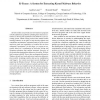Free Online Productivity Tools
i2Speak
i2Symbol
i2OCR
iTex2Img
iWeb2Print
iWeb2Shot
i2Type
iPdf2Split
iPdf2Merge
i2Bopomofo
i2Arabic
i2Style
i2Image
i2PDF
iLatex2Rtf
Sci2ools
104
click to vote
NDSS
2009
IEEE
2009
IEEE
K-Tracer: A System for Extracting Kernel Malware Behavior
Kernel rootkits can provide user level-malware programs with the additional capabilities of hiding their malicious activities by altering the legitimate kernel behavior of an operating system. While existing research has studied rootkit hooking behavior in an effort to help develop defense and remediation mechanisms, automated analysis of the actual malicious goals and capabilities of rootkits has not been adequately investigated. In this paper, we present an approach based on a combination of backward slicing and chopping techniques that enables automatic discovery of the system data manipulation behaviors of rootkits. We have built a system called K-Tracer that can dynamically analyze Windows kernel-level code and extract malicious behaviors from rootkits, including sensitive data access, modification and triggers. Our system overcomes several challenges of analyzing the Windows Kernel. We have performed experiments on several kernel malware samples and shown that our system can su...
Related Content
| Added | 21 May 2010 |
| Updated | 21 May 2010 |
| Type | Conference |
| Year | 2009 |
| Where | NDSS |
| Authors | Andrea Lanzi, Monirul I. Sharif, Wenke Lee |
Comments (0)

